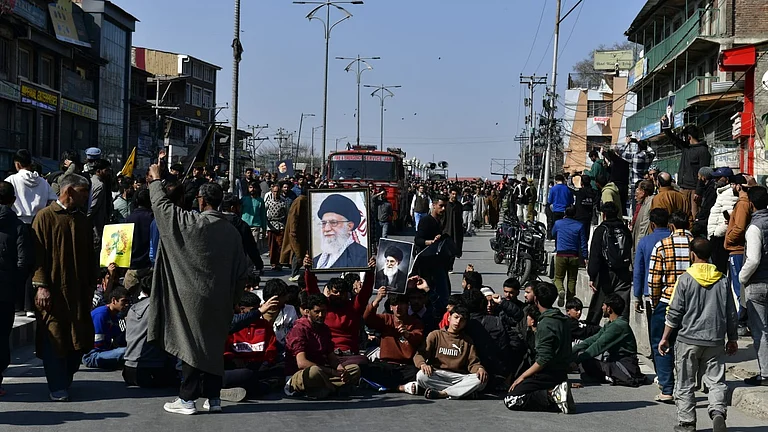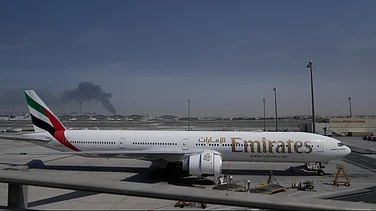As ‘The three Brotherhood Alliance' comprised Myanmar National Democratic Alliance Army (MNDAA), the Ta’ang National Liberation Army (TNLA), and the Arakan Army (AA) have launched a massive offensive in northern Myanmar, many experts argue that the alliance and other “resistance forces” control a substantial part of the country. They say the changes reflect rapidly "shifting geographies of the power" in Myanmar and a lot depends upon how China and India will respond.
While explaining what is happening in the neighbouring country, Angshuman Choudhury, Associate Fellow at the New Delhi-based Centre for Policy Research, tells Outlook the military has lost a large portion of the country to the ethnic armies in terms of effective control, especially after the operations that began on October 27 this year. That day an alliance of ethnic armed organisations launched coordinated attacks on military posts in northern Shan State bordering China and took several towns and border crossings. The rebels call the long-planned operation 1027, referring to the date the assault began. “Operation 1027 started in the north in Shan State along the China-Myanmar border. Now resistance forces have spread to other areas including the Indian-Myanmar border like Chin state and in these places, they have been able to hold on to towns and urban centres and border trading points. It has been a month and the military has been unable to capture these areas back,” Choudhury says.
He says even before the operation, many argued that the military had no effective control over “probably not more than 60 per cent territory.” “Sometimes National Unity Government claim they hold around 70 per cent of the country. Since both the Military Junta and the National Unity Government are stakeholders in the conflict, you cannot buy what either party says. But at the same time you cannot ignore that Three Brotherhood Alliance and others are controlling a substantial portion of the country,” Choudhury says.
There are some independent reports like one by the Special Advisory Council, which is a third-party organisation having diplomats from Australia, South Korea and Indonesia. They have said up to 25 per cent of the country is controlled by “resistance forces”. “I think exact figures are hard to collaborate but we can say the military has lost control of a significant portion of the country.”
Myanmar has been in turmoil since the military ousted a government led by Nobel peace laureate Aung San Suu Kyi in a 2021 coup, ending a decade of tentative democratic reform and triggering widespread protests. In various parts of the country, democracy activists have taken up arms alongside ethnic minority armies who have been battling for self-determination for decades.
Three Brotherhood Alliance
The "Three Brotherhood Alliance", as the group is known, have claimed they are "dedicated to eradicating the oppressive military dictatorship", and committed to combating online gambling scam centres on the Myanmar-China border.
Choudhury says the Three Brotherhood Alliance is not a recent development. He says it has been there for the past around six years. “The ethnic armed organisations had persisted in rejecting ceasefire offers from the military describing it as a ploy to disarm them.”
Besides the Three Brotherhood Alliance, which was formed in 2017-2018, there is also the "Northern Alliance", which includes the three constituent ethnic armies plus the Kachin Independence Army (KIA). Then there is the Federal Political Negotiation and Consultative Committee (FPNCC), a group of seven big non-ceasefire ethnic armed organisations in the north led by the United Wa State Army (UWSA).
He says the immediate trigger for the fresh offensive is scam centres in the north, which are run by the pro-military militia and many of the victims of the cyber scam centres are Chinese. He says the Chinese have been asking the junta to shut down the scam operations that target and enslave Chinese citizens. “The junta didn’t shut them down as they are a big revenue resource for the junta.” Choudhury says it looks Chinese allowed the Myanmar National Democratic Alliance Army (MNDAA), also known as the ‘Kokang army’, alongside the Ta’ang National Liberation Army (TNLA) and the Arakan Army (AA) to target these centres. However, he says, it would be simplistic to conclude that the Chinese started a fresh offensive as these rebel groups have their own interest and have a larger goal to overthrow military control of the country.
According to the UNHCR, the UN refugee agency, Conflict triggered by the military takeover in 2021 has resulted in recurring, protracted and new displacement, and complicated the search for solutions. Thousand fled the country and 1.95 million people are currently displaced within Myanmar.
In its July this year report “Time is Running Out for India’s Balancing Act on the Myanmar Border” by the United States Institute of Peace said, “India has had a simmering crisis on its northeastern border since the Myanmar military’s February 2021 coup d’état. Over 50,000 civilians have fled across the border from Myanmar’s Chin State and Sagaing Region into India’s northeast.” It said New Delhi has maintained a delicate balancing act, allowing refugees into the country but refraining from political pressure on the junta and its State Administrative Council (SAC).
Options for India
Choudhury says the option for India in Myanmar is to play on the front foot. “I think India should have done it long back, particularly in the months following the coup.”
“We should seriously engage with the ethnic armed organisations and other rebel groups in Chin State, Sagaing Region and Rakhine State. These regions are important to us as many of our projects, like the Kaladan Multi-Modal Transit and Transport Project (KMMTTP), pass through them.”
“And if the groups of these regions are hostile to India and they don’t have working relations with India, then we will have a problem.”
“My point is in order to protect our security and developmental projects we need to work with the people who control these territories,” he adds. “In the current context neutrality is no policy at all. There is no option to be neutral. The military junta is hugely unpopular in Myanmar even among the Bamars,” he says. The Bamars are the ruling majority ethnic group and gave the country its name. “They too have comprehensively rejected the military.”
“So any country that even nominally engages with the military will be seen as pro-military. That is why I am arguing that even if India is engaging with other parties behind closed doors and talking to the military in the open, India will be seen as pro-junta,” he argues. “My conversations with members of pro-democracy forces of Myanmar made it clear that they feel India betrayed them by engaging with the military.”
Choudhury says in Myanmar ground has changed and the majority of the people are against the Army. “They are very much insistent on restoring democracy and will have it no other way. Many in India think the situation will limp back to normalcy under junta rule, like in the 1990s, and the army will regain control. Such an approach is a problem.”
While explaining Chinese involvement in Myanmar, Choudhury said that China did not want instability along the border. “Chinese top priority is BRI. And for the BRI you need stability to move forward. Chinese seem fed with the violence as the BRI projects are not making any headway and the biggest hit is China-Myanmar Economic Corridor. And the town through which the China-Myanmar Economic Corridor enters Myanmar has been captured by the rebels now,” he says.
“I think the Chinese want stability on the ground to forward their Chinese economic agenda. Chinese are playing a double game and even before the Coup they had good relations with United Wa State Army and others. China always wanted to manoeuvre the conflict in its favour. They are talking to resistance forces and also maintain the line with the military,” he adds.






















